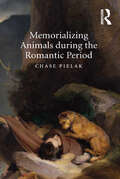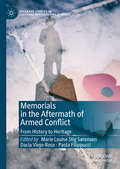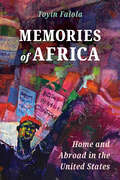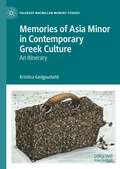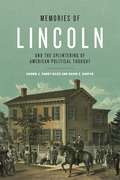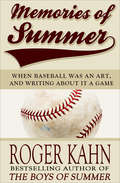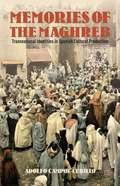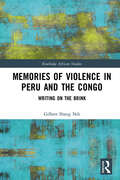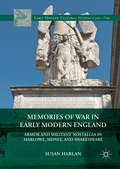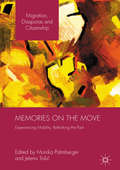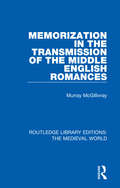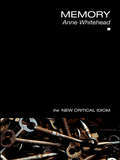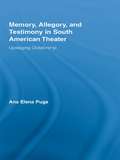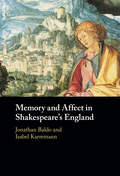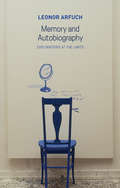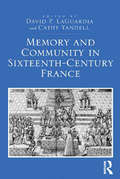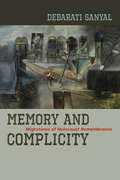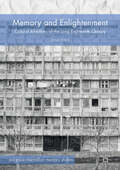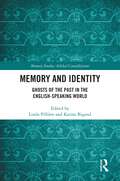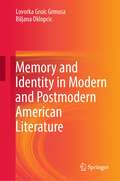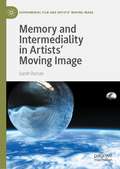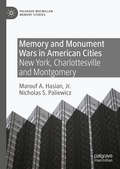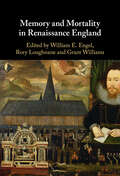- Table View
- List View
Memorializing Animals during the Romantic Period
by Chase PielakEarly nineteenth-century British literature is overpopulated with images of dead and deadly animals, as Chase Pielak observes in his study of animal encounters in the works of Charles and Mary Lamb, John Clare, Samuel Taylor Coleridge, Lord Byron, and William Wordsworth. These encounters, Pielak suggests, coincide with anxieties over living alongside both animals and cemeteries in the late eighteenth and early nineteenth-centuries. Pielak traces the linguistic, physical, and psychological interruptions occasioned by animal encounters from the heart of communal life, the table, to the countryside, and finally into and beyond the wild cemetery. He argues that Romantic period writers use language that ultimately betrays itself in beastly disruptions exposing anxiety over what it means to be human, what happens at death, the consequences of living together, and the significance of being remembered. Extending his discussion past an emphasis on animal rights to an examination of animals in their social context, Pielak shows that these animal representations are both inherently important and a foreshadowing of the ways we continue to need images of dead and deadly Romantic beasts.
Memorials in the Aftermath of Armed Conflict: From History to Heritage (Palgrave Studies in Cultural Heritage and Conflict)
by Marie Louise Stig Sørensen Dacia Viejo-Rose Paola FilippucciThrough case studies from Europe and Russia, this volume analyses memorials as a means for the present to make claims on the past in the aftermath of armed conflict. The central contention is that memorials are not backward-looking, inert reminders of past events, but instead active triggers of personal and shared emotion, that are inescapably political, bound up with how societies reconstruct their present and future as they negotiate their way out of (and sometimes back into) conflict. A central aim of the book is to highlight and illustrate the cultural and ethical complexity of memorials, as focal points for a tension between the notion of memory as truth, and the practice of memory as negotiable. By adopting a relatively bounded temporal and spatial scope, the volume seeks to move beyond the established focus on national traditions, to reveal cultural commonalities and shared influences in the memorial forms and practices of individual regions and of particular conflicts.
Memories of Africa: Home and Abroad in the United States (Atlantic Migrations and the African Diaspora)
by Toyin Falola2023 CHOICE Outstanding Academic TitleMemories of Africa: Home and Abroad in the United States suggests a new lens for viewing African Diaspora studies: the experiences of African memoirists who live in the United States. The book shows how African Diaspora memoirs beautifully and grippingly depict the experiences of African migrants over time through political, social, and cultural spheres. In reading African Diaspora memoirs from the transatlantic slave trade period to the present, a reader can understand the complexity of the African migrant legacy and evolution.Author Toyin Falola argues that memoirs are significant not only in their interpretation of events conveyed by the memoirists but also in demonstrating how interpersonal and human the stories told can be. Memoirs are powerful because they are emotionally captivating and because important themes and events circulate around a particular person (in this case, the memoirist). Undoubtedly, a memoir is significant because it can teach anyone about a part of the human experience, even if the “facts” are not described without bias. Through this sort of narrative, the reader cannot help but enter into the memoirist’s mind and, therefore, feel more empathy for them. In doing so, the reader can “feel” what the memoirist feels and “see” what the memoirist sees as clearly as is humanly possible. In this way, the historical events and life lessons become tangible and poignantly real to the reader.
Memories of Asia Minor in Contemporary Greek Culture: An Itinerary (Palgrave Macmillan Memory Studies)
by Kristina GedgaudaitėThe Greco-Turkish War (1919-1922) in Asia Minor and the Population Exchange that followed led to the forced displacement of more than 1.5 million people who became entangled in the nation-building processes of both Greece and Turkey. This book examines the memories that shaped Asia Minor refugee identity, focusing on the ways in which these memories continue to reverberate in contemporary Greek culture. It explores how memories of Asia Minor frame wider social debates, foster affective alliances, inform different notions of belonging and provide a toolkit for addressing contemporary concerns. Taking the reader across a wide range of cultural works—history textbooks, comics, theatre, documentary and fiction films, news footage and photography—the book shows how these works have become means for individuals and communities to contribute to the process of history-making. While keeping its focus on present-day Greece, Memories of Asia Minor joins wider global debates over contested pasts, legacies of war and refugeehood.
Memories of Lincoln and the Splintering of American Political Thought (Rhetoric and Democratic Deliberation #14)
by Shawn J. Parry-Giles David S. KauferIn the aftermath of the Civil War, Republicans and Democrats who advocated conflicting visions of American citizenship could agree on one thing: the rhetorical power of Abraham Lincoln’s life. This volume examines the debates over his legacy and their impact on America’s future.In the thirty-five years following Lincoln’s assassination, acquaintances of Lincoln published their memories of him in newspapers, biographies, and edited collections in order to gain fame, promote partisan aims, champion his hardscrabble past and exalted rise, and define his legacy. Shawn Parry-Giles and David Kaufer explore how style, class, and character affected these reminiscences. They also analyze the ways people used these writings to reinforce their beliefs about citizenship and presidential leadership in the United States, with specific attention to the fissure between republicanism and democracy that still exists today. Their study employs rhetorical and corpus research methods to assess more than five hundred reminiscences.A novel look at how memories of Lincoln became an important form of political rhetoric, this book sheds light on how divergent schools of U.S. political thought came to recruit Lincoln as their standard-bearer.
Memories of Summer: When Baseball Was an Art, and Writing about It a Game
by Roger KahnThe legendary sportswriter&’s memoir of Brooklyn, baseball, and a life in journalism: &“Simply put, this is a marvelous book&” (Kirkus Reviews). In this book, the bestselling author of The Boys of Summer shares stories of his Depression-era Brooklyn childhood, his career during a golden era of sports, and his personal acquaintances with a wide range of great ballplayers. His father had a passion for the Dodgers; his mother&’s passion was for poetry. Young Roger managed to blend both loves in a career that encompassed writing about sports for the New York Herald Tribune, Sports Illustrated, the Saturday Evening Post, Esquire, and Time. Kahn recalls the great personalities—Leo Durocher, Mickey Mantle, Willie Mays, Jackie Robinson, Red Smith, Dick Young, and many more—and recollects the wittiest lines from forty years in dugouts, press boxes, and newsrooms. &“A master at evoking a sense of the past . . . A pleasing potpourri of autobiography, professional memoir, and anecdotal baseball history . . . Of special note to journalism buffs is Kahn&’s account of his role in the inception of Sports Illustrated.&” —Booklist &“As a kid, I loved sports first and writing second, and loved everything Roger Kahn wrote. As an adult, I love writing first and sports second, and love Roger Kahn even more.&” —David Maraniss, Pulitzer Prize–winning journalist and author &“Roger Kahn is the best baseball writer in the business.&” —Stephen Jay Gould, New York Review of Books
Memories of the Maghreb
by Adolfo Campoy-CubilloUsing a cultural studies approach, this book explores how the Spanish colonization of North Africa continues to haunt Spain's efforts to articulate a national identity that can accommodate both the country's diversity, brought about by immigration from its old colonies, and the postnational demands of its integration in the European Union.
Memories of Violence in Peru and the Congo: Writing on the Brink (Routledge African Studies)
by Gilbert Shang NdiThe book presents an intertextual and comparative analysis of memories of violence in Peruvian and Congolese Literature. Examining a variety of novels that offer insightful representations of violence in their respective historical settings, the author argues that similar historical experiences between Latin America and Africa engender ethical/aesthetic responses and enhance trans-continental critical dialogues in comparative literary studies. In the same way that the drama of the Congo has become the symbolic open wound of (post)colonial dispensation in Africa, Spanish conquest in Latin America also produced spaces where the legacy of colonialism is strongly visible and memorable, providing fertile ground for the reproduction of violence. This book explores the concept and reality of violence beyond its most obvious manifestations, demonstrating how in the colonial contexts of Peru and the Congo, violence was a function of (post)colonial power dynamics and deeply engrained socio-political, economic and cultural ordering and othering. From this perspective, the work considers and re-examines theoretical contributions from authors such as John Galtung, Michel Foucault, Immanuel Wallerstein, Anibal Quijano, Frantz Fanon, Achille Mbembe, Eboussi Boulaga, Pierre Nora, Susan Sontag, Stevan Weine, Cathy Caruth and Nelson Maldonado-Torres. This book will be of interest for scholars working on how violence is explored and represented in literature and other art forms.
Memories of War in Early Modern England
by Susan HarlanThis book examines literary depictions of the construction and destruction of the armored male body in combat in relation to early modern English understandings of the past. Bringing together the fields of material culture and militarism, Susan Harlan argues that the notion of "spoiling" - or the sanctioned theft of the arms and armor of the vanquished in battle - provides a way of thinking about England's relationship to its violent cultural inheritance. She demonstrates how writers reconstituted the spoils of antiquity and the Middle Ages in an imagined military struggle between male bodies. An analysis of scenes of arming and disarming across texts by Christopher Marlowe and William Shakespeare and tributes to Sir Philip Sidney reveals a pervasive militant nostalgia: a cultural fascination with moribund models and technologies of war. Readers will not only gain a better understanding of humanism but also a new way of thinking about violence and cultural production in Renaissance England.
Memories on the Move: Experiencing Mobility, Rethinking the Past (Migration, Diasporas and Citizenship)
by Monika Palmberger and Jelena Tošić‘Through a series of excellent essays this volume uses concrete ethnographic analyses of memory practices in different parts of the globe to offer theoretical reflections on how memory shapes and is shaped by mobility in time and space.’ - Marianne Hirsch, Columbia University, USA‘Memories on the Move is a brilliant edited volume that fills an important gap in the field of memory studies as it weaves together issues of mobility and remembering. Drawing on fine-grained ethnographical cases, it offers a rich and complex portrait of mnemonic constructions in the context of forced migration, exile and transnationalism. It is clearly a must-read for anthropologists, sociologists, historians and political scientists as well as for all scholars interested in the contemporary dynamics of memory, identity and mobility.’ – David Berliner, Université Libre de Bruxelles, Belgium‘This thought-provoking volume disentangles, ethnographically, the complexity of meaning-making practices of memory/forgetting in various contexts of (im)mobility.’ - Noel B. Salazar, University of Leuven, BelgiumBringing together vivid ethnographic material, this book opens up a timely conversation between memory and mobility/migration studies. It goes beyond the idea of the nation state as the primary unit of analysis to explore how people on the move use different forms and media of remembering to make sense of their lives and act as political subjects. Investigating when and by what means people on the move remember and communicate memories in the context of various forms of (im)mobility, the authors examine photographs, films, the reinhabiting of pre-exilic homes, pseudo-historical performances, transgenerational mnemonic gatherings and transnational political activism. This edited collection will appeal to scholars of anthropology, sociology, political science, human geography, history and oral history.
Memorization in the Transmission of the Middle English Romances (Routledge Library Editions: The Medieval World #34)
by Murray McGillivrayOriginally published in 1990, Memorization in the Transmission of the Middle English Romances tackles the long-standing issue of the role of memorization in the transmission of Middle English romances. The book addresses the lack of consensus on the issue, despite extensive discussion, putting forth the theory that the heterogeneity of the poems of this period, grouped under the general heading of ‘medieval romance’, makes generalizations about the history of transmissions unreliable. The book suggests that oral-formulaic theory has been applied over-literally to oral or oral derived works, through the assumption that all poems answer the same structural criteria. The book also looks at the aspects of orality and performance theory alongside the textuality and intertextuality of these medieval texts.
Memory: A Reader (The New Critical Idiom)
by Anne WhiteheadThe concept of ‘memory’ has given rise to some of the most exciting new directions in contemporary theory. In this much-needed guide to a burgeoning field of a study, Anne Whitehead: presents a history of the concept of ‘memory’ and its uses, encompassing both memory as activity and the nature of memory examines debates around the term in their historical and cultural contexts introduces the reader to key thinkers in the field, from ancient Greece to the present day traces the links between theorisations and literary representations of memory. Offering a clear and succinct guide to one of the most important terms in contemporary theory, this volume is essential reading for anyone entering the field of Memory Studies, or seeking to understand current developments in Cultural and Literary Studies.
Memory, Allegory, and Testimony in South American Theater: Upstaging Dictatorship (Routledge Advances in Theatre & Performance Studies #Vol. 8)
by Ana Elena PugaMemory, Allegory, and Testimony in South American Theater traces the shaping of a resistant identity in memory, its direct expression in testimony, and its indirect elaboration in two different kinds of allegory. Each chapter focuses on one contemporary playwright (or one collaborative team, in the case of Brazil) from each of four Southern Cone countries and compares the playwrights’ aesthetic strategies for subverting ideologies of dictatorship: Carlos Manuel Varela (memory in Uruguay), Juan Radrigán (testimony in Chile), Augusto Boal and his co-author Gianfrancesco Guarnieri (historical allegory in Brazil), Griselda Gambaro (abstract allegory in Argentina).
Memory and Affect in Shakespeare's England
by Jonathan Baldo Isabel KarremannThis is the first collection to systematically combine the study of memory and affect in early modern culture. Essays by leading and emergent scholars in the field of Shakespeare studies offer an innovative research agenda, inviting new, exploratory approaches to Shakespeare's work that embrace interdisciplinary cross-fertilization. Drawing on the contexts of Renaissance literature across genres and on various discourses including rhetoric, medicine, religion, morality, historiography, colonialism, and politics, the chapters bring together a broad range of texts, concerns, and methodologies central to the study of early modern culture. Stimulating for postgraduate students, lecturers, and researchers with an interest in the broader fields of memory studies and the history of the emotions – two vibrant and growing areas of research – it will also prove invaluable to teachers of Shakespeare, dramaturges, and directors of stage productions, provoking discussions of how convergences of memory and affect influence stagecraft, dramaturgy, rhetoric, and poetic language.
Memory and Autobiography: Explorations at the Limits (Critical South)
by Leonor ArfuchThis book by one of Latin America’s leading cultural theorists examines the place of the subject and the role of biographical and autobiographical genres in contemporary culture. Arfuch argues that the on-going proliferation of private and intimate stories – what she calls the ‘biographical space’ – can be seen as symptomatic of the impersonalizing dynamics of contemporary times. Autobiographical genres, however, harbour an intersubjective dimension. The ‘I’ who speaks wants to be heard by another, and the other who listens discovers in autobiography possible points of identification. Autobiographical genres, including those that border on fiction, therefore become spaces in which the singularity of experience opens onto the collective and its historicity in ways that allow us to reflect on the ethical, political, and aesthetic dimensions not only of self-representation but also of life itself. Opening up debate through juxtaposition and dialogue, Arfuch’s own poetic writing moves freely from the Holocaust to Argentina’s last dictatorship and its traumatic memories, and then to the troubled borderlands between Mexico and the United States to show how artists rescue shards of memory that would otherwise be relegated to the dustbin of history. In so doing, she makes us see not only how challenging it is to represent past traumas and violence but also how vitally necessary it is to do so as a political strategy for combating the tides of forgetting and for finding ways of being in common.
Memory and Community in Sixteenth-Century France
by David P. LaGuardia Cathy YandellMemory and Community in Sixteenth-Century France engages the question of remembering from a number of different perspectives. It examines the formation of communities within diverse cultural, religious, and geographical contexts, especially in relation to the material conditions for producing texts and discourses that were the foundations for collective practices of memory. The Wars of Religion in France gave rise to numerous narrative and graphic representations of bodies remembered as icons and signifiers of the religious ’troubles.’ The multiple sites of these clashes were filled with sound, language, and diverse kinds of signs mediated by print, writing, and discourses that recalled past battles and opposed different factions. The volume demonstrates that memory and community interacted constantly in sixteenth-century France, producing conceptual frames that defined the conflicting groups to which individuals belonged, and from which they derived their identities. The ongoing conflicts of the Wars hence made it necessary for people both to remember certain events and to forget others. As such, memory was one of the key ideas in a period defined by its continuous reformulations of the present as a forum in which contradictory accounts of the recent past competed with one another for hegemony. One of the aims of Memory and Community in Sixteenth-Century France is to remedy the lack of scholarship on this important memorial function, which was one of the intellectual foundations of the late French Renaissance and its fractured communities.
Memory and Complicity: Migrations of Holocaust Remembrance
by Debarati SanyalSince World War II, French and Francophone literature and film have repeatedly sought not to singularize the Holocaust as the paradigm of historical trauma but rather to connect its memory with other memories of violence, namely that of colonialism. These works produced what Debarati Sanyal calls a “memory-in-complicity” attuned to the gray zones that implicate different regimes of violence across history as well as those of different subject positions such as victim, perpetrator, witness, and reader/spectator. Examining a range of works from Albert Camus, Primo Levi, Alain Resnais, and Jean-Paul Sartre to Jonathan Littell, Assia Djebar, Giorgio Agamben, and Boualem Sansal, Memory and Complicity develops an inquiry into the political force and ethical dangers of such implications, contrasting them with contemporary models for thinking about trauma and violence and offering an extended meditation on the role of aesthetic form, especially allegory, within acts of transhistorical remembrance. What are the political benefits and ethical risks of invoking the memory of one history in order to address another? What is the role of complicity in making these connections? How does complicity, rather than affect based discourses of trauma, shame and melancholy, open a critical engagement with the violence of history? What is it about literature and film that have made them such powerful vehicles for this kind of connective memory work? As it offers new readings of some of the most celebrated and controversial novelists, filmmakers, and playwrights from the French-speaking world, Memory and Complicity addresses these questions in order to reframe the way we think about historical memory and its political uses today.
Memory and Enlightenment: Cultural Afterlives of the Long Eighteenth Century (Palgrave Macmillan Memory Studies)
by James WardThis book illuminates how the ‘long eighteenth century’ (1660-1800) persists in our present through screen and performance media, writing and visual art. Tracing the afterlives of the period from the 1980s to the present, it argues that these emerging and changing forms stage the period as a point of origin for the grounding of individual identity in personal memory, and as a site of foundational traumas that shape cultural memory.
Memory and Identity: Ghosts of the Past in the English-speaking World (Memory Studies: Global Constellations)
by Linda Pillière Karine BigandThis book examines the ways in which ghosts haunt and shape cultural identities and memory, considering the manner in which the fluctuations of such identities sometimes imply the rethinking or rewriting of the past. Drawing on case studies in historical, political, literary and linguistic studies, it explores the narratives that produce imagined communities and identities and the places in which cultural identities are constructed through memory, asking how far these identities and memories disinherit or exclude otherness, and how far ghosts disturb orderly narratives, inviting multiple readings of the past. Thematically organized to consider the persistence of ghosts within present memory and identity, the creation of new identities through intertwining narratives of the past, and the reclamation of identities in postcolonial contexts, Memory and Identity: Ghosts of the past in the English-speaking world offers a multi-disciplinary examination of the concept of haunting. Memory and Identity will appeal to scholars of sociology, anthropology, cultural studies and history with interests in memory and identity.
Memory and Identity in Modern and Postmodern American Literature
by Lovorka Gruic Grmusa Biljana OklopcicThis book discusses how American literary modernism and postmodernism interconnect memory and identity and if, and how, the intertwining of memory and identity has been related to the dominant socio-cultural trends in the United States or the specific historical contexts in the world. The book’s opening chapter is the interrogation of the narrator’s memories of Jay Gatsby and his life in F. Scott Fitzgerald’s The Great Gatsby. The second chapter shows how in William Faulkner’s Light in August memory impacts the search for identities in the storylines of the characters. The third chapter discusses the correlation between memory, self, and culture in Tennessee Williams’s A Streetcar Named Desire. Discussing Robert Coover’s Gerald’s Party, the fourth chapter reveals that memory and identity are contextualized and that cognitive processes, including memory, are grounded in the body’s interaction with the environment, featuring dehumanized characters, whose identities appear as role-plays. The subsequent chapter is the analysis of how Jonathan Safran Foer’s Everything Is Illuminated deals with the heritage of Holocaust memories and postmemories. The last chapter focuses on Thomas Pynchon’s Against the Day, the reconstructive nature of memory, and the politics and production of identity in Southeastern Europe.
Memory and Intermediality in Artists’ Moving Image (Experimental Film and Artists’ Moving Image)
by Sarah DurcanThis book addresses the preoccupation with memory in contemporary artists’ moving image installations. It situates artists’ moving image in relation to the transformations of digitalization as hybrid intermedial combinations of analogue film, video and digital video emerge from mid 1990s onwards. While film has always been closely associated with the process of memory, this book investigates new models of memory in artists’ remediation of film with video and other intermedial aesthetics. Beginning with a chapter on the theorization of memory and the moving image and the diverse genealogies of artists’ film and video, the following chapters identify five different mnemonic modes in artists’ moving image: critical nostalgia, database narrative, the ‘echo-chamber’, documentary fiction and mediatized memories. Stan Douglas, Steve McQueen, Runa Islam, Mark Leckey and Elizabeth Price are of a generation that has lived through the transition from analogue to digital. Their emphasis on the nuances of intermediality indicates the extent to which we remember through media.
Memory and Memorials: From the French Revolution to World War One (Routledge Studies In Memory And Narrative Ser.)
by Jr. ShapiroFocusing on the "long" nineteenth century, from the French Revolution to the beginnings of Modernism, this book examines the significance of memory in this era of turbulent social change. Through investigation of science, literature, history and the visual arts, the authors explore theories of memory and the cultural and literary resonances of memorializing.Drawing on the work of many of the most influential literary figures of the period, such as Tennyson, Scott, and Hardy, Memory and Memorials explores key topics such as: gender and memory; Victorian psychological theories of memory; and cultural constructions in literature, science, history and architecture.Memory and Memorials: From the French Revolution to World War One employs a range of new and influential interdisciplinary methodologies. It offers both a fresh theoretical understanding of the period, and a wealth of empirical material of use to the historian, literary critic or social psychologist.
Memory and Monument Wars in American Cities: New York, Charlottesville and Montgomery (Palgrave Macmillan Memory Studies)
by Marouf A. Hasian Jr. Nicholas S. PaliewiczThis book is about the ways U.S. cities have responded to some of the most pressing political, cultural, racial issues of our time as agentic, remembering actors. Our case studies include New York City’s securitized remembrances at the National September 11 Memorial and Museum; Charlottesville’s Confederate monument controversies in the wake of the 2017 Unite the Right Rally; and Montgomery’s “double consciousness” at the National Memorial for Peace and Justice and Legacy Museum. By tracing the genealogies that can be found across three contested cityscapes—New York, Charlottesville, and Montgomery—this book opens up new vistas for research for communication studies as it shows how cities are agentic actors that can wage “war” on urban landscapes as massive actor-networks struggling to remember (and forget). With the rise of sanctuary cities against nativistic immigration policies, “invasions” from white supremacists and neo-Nazis objecting to “the great replacement,” and rhizomic uprisings of Black Lives Matter protests in response to lethal police force against persons of color, this timely book speaks to the emergent realities of how cities have become battlegrounds in America’s continuing cultural wars.
Memory and Mortality in Renaissance England
by Grant Williams William E. Engel Rory LoughnaneDrawing together leading scholars of early modern memory studies and death studies, Memory and Mortality in Renaissance England explores and illuminates the interrelationships of these categories of Renaissance knowing and doing, theory and praxis. The collection features an extended Introduction that establishes the rich vein connecting these two fields of study and investigation. Thereafter, the collection is arranged into three subsections, 'The Arts of Remembering Death', 'Grounding the Remembrance of the Dead', and 'The Ends of Commemoration', where contributors analyse how memory and mortality intersected in writings, devotional practice, and visual culture. The book will appeal to scholars of early modern literature and culture, book history, art history, and the history of mnemonics and thanatology, and will prove an indispensable guide for researchers, instructors, and students alike.
